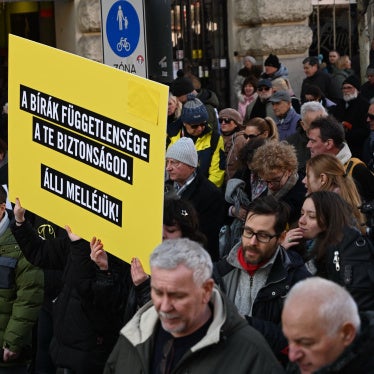U.S. and British forces in Iraq must act more decisively to enforce public order in areas under their authority, Human Rights Watch urged today
International law requires that occupying powers must ensure the safety of the civilian population in areas under their control.
Looters in Baghdad have ransacked hospitals and medical facilities, endangering the health of the local population. In some areas, armed clashes between property owners and looters have broken out. Isolated reports of vengeance killings have begun to emerge as Iraqi civilians and uncontrolled armed groups begin searching for suspected supporters of Saddam Hussein.
During the brief 1991 uprisings in Iraq, vengeance killings took the lives of thousands of people who were suspected of links to the government of Saddam Hussein. Many were innocent civilians.
Some U.S. government officials have seemed unaware of their obligations under international law to act promptly to prevent looting and other disturbances.
"Coalition forces have to stop the lawlessness now," said Kenneth Roth, executive director of Human Rights Watch. "Restoring public order is an urgent matter and it has to be a top priority if serious harm to civilians is going to be avoided."
U.S. Secretary of Defense Donald Rumsfeld said yesterday, "While no one condones looting, on the other hand, one can understand the pentup feelings that may result from decades of repression and people who have had members of their family killed by that regime, for them to be taking their feelings out on that regime." Secretary Rumsfeld has also said the U.S. forces will patrol Iraqi cities to prevent lawlessness, but reports from the field suggest that coalition forces are not doing enough to prevent disturbances.
U.S. Maj. Gen. Stanley McChrystal said on April 10 that "Looting is a problem, but it is not a major threat. People are not being killed in looting. So that's something we have to do as we have the time and capability to do it."
Under international humanitarian law, or the laws of war, an occupying power has a duty to restore and ensure public order and safety in the territory under its authority. Military commanders on the spot must prevent and where necessary suppress serious violations involving the local population. Ensuring local security includes protecting people from reprisals and revenge attacks, such as those directed against members of minority populations or government officials. This may require that occupying forces be deployed to secure public order until the time police personnel, whether local or international, can be mobilized for such responsibilities.
"This lawlessness is something for which the coalition forces should have been prepared," Roth said.
An occupying power also has a duty under international law to ensure food and medical services to the population "to the fullest extent of the means available to it." Medical personnel, including recognized Red Cross/Red Crescent societies, should be allowed to carry out their duties. Should any part of the population of an occupied territory be inadequately supplied, the occupying power is obligated to facilitate relief by humanitarian agencies. However, the provision of assistance by humanitarian agencies does not relieve the occupying force of its responsibilities to meet the needs of the population.







